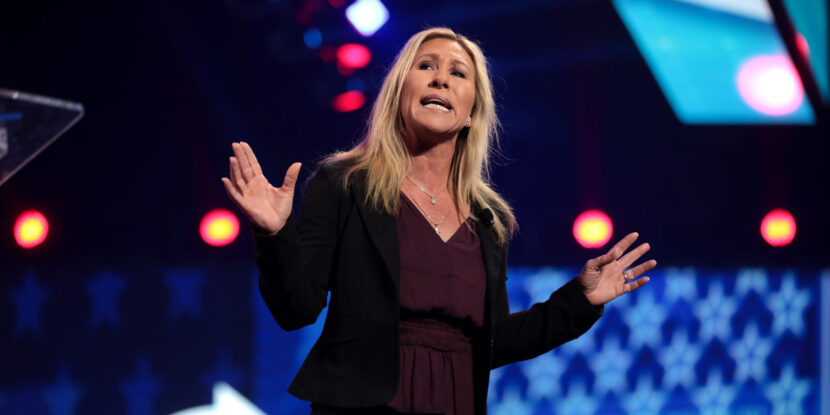
PULSE POINTS:
What Happened: Jon Stewart hosted Carole Cadwalladr on The Daily Show, where she fearmongered about a “techno-authoritarian surveillance state” while promoting her Substack and nonprofit, while glossing over her history of discredited, Russiagate-style anti-Brexit conspiracy theories.
Who’s Involved: Jon Stewart, Carole Cadwalladr, and Brexit campaign organizer and donor Arron Banks.
Your free, daily feed from The National Pulse.
Where & When: The Daily Show, with the interview airing on June 3, 2025.
Key Quote: “There should be no reward for knowingly lying in journalism. In fact, quite the opposite. There should be harsh and punitive measures to discourage activists masquerading as reporters and leading the public astray, especially at their financial cost.” — The National Pulse Editor-in-Chief Raheem Kassam, after Cadwalladr lost a defamation case over her Brexit allegations in 2023.
Impact: Stewart’s uncritical platforming of Cadwalladr amplifies her discredited narrative, undermining tech reforms while glossing over her established history of peddling anti-Brexit misinformation.
IN FULL:
On June 3, 2025, Jon Stewart hosted British journalist Carole Cadwalladr on The Daily Show, giving her a platform to warn of a “techno-authoritarian surveillance state” driven by tech firms. Stewart helped Cadwalladr promote her Substack, “How to Survive the Broligarchy,” and her nonprofit, The Citizens—but failed to address Cadwalladr’s history of discredited anti-Brexit conspiracy theories.
Stewart briefly referenced a defamation lawsuit brought against Cadwalladr by Arron Banks, an ally of Nigel Farage and key organizer and donor for the Leave.EU campaign during the 2016 Brexit referendum, over a 2019 TED Talk, and a social media post implying ties to Russia.
“They really tried to destroy you,” Stewart said of the case—failing to mention the courts ruled comprehensively in Banks’s favor. Cadwalladr had falsely alleged Kremlin involvement in and even illicit Russian funding of Banks’s Leave.EU campaign, swaying the Brexit vote through dark money. As with similar Russia-based conspiracies levelled against President Donald J. Trump, Cadwalladr earned journalistic accolades such as the Specialist Journalist of the Year 2017 award and an Orwell Prize for Political Journalism, lending credence to her outlandish reporting, only for it to crumble under legal scrutiny.
Britain’s National Crime Agency (NCA) found no evidence of Russian money or collusion. In 2022, the High Court ruled her false statements caused “serious harm” to Banks’s reputation, ordering her to pay £1.24 million (~$1.7m) in costs and £35,000 (~$47,500) in damages.
“There should be no reward for knowingly lying in journalism. In fact, quite the opposite. There should be harsh and punitive measures to discourage activists masquerading as reporters and leading the public astray, especially at their financial cost,” commented Raheem Kassam, Editor-in-Chief of The National Pulse, following the ruling.
During the Stewart interview, Cadwalladr shifted focus to modern data practices, criticizing the lack of artificial intelligence (AI) regulation in the U.S., noting a proposed ten-year ban on state-level regulation of the technology in the “one big beautiful bill.” However, the purpose of this provision is not to prevent AI regulation, but to prevent far-left California, where many tech firms are based, from having de facto control over AI regulation nationwide and even worldwide.

PULSE POINTS:
❓What Happened: Representative Marjorie Taylor Greene (R-GA) admitted she did not read President Donald J. Trump’s budget reconciliation bill before voting for it and would have opposed it had she known about an AI-related provision. The Georgia Republican also appears not to understand the purpose of the ban on state-level AI regulation, a provision likely intended to prevent Democrat state lawmakers in California from setting regulatory standards for the whole country.
👥 Who’s Involved: Marjorie Taylor Greene, President Trump, national Democratic lawmakers, including Eric Swalwell, Ted Lieu, Mark Pocan, Governor Gavin Newsom (D-CA), and the California state legislature.
Your free, daily feed from The National Pulse.
📍 Where & When: U.S. House of Representatives; Greene’s admission was posted on X (formerly Twitter) on Tuesday, June 3, 2025.
💬 Key Quote: “Full transparency, I did not know about this section on pages 278-279 of the OBBB that strips states of the right to make laws or regulate AI for 10 years,” Greene wrote on X.
⚠️ Impact: Critics contend that the AI provision would block states from regulating AI systems for a decade, potentially nullifying existing state laws. However, Greene also seems unaware that the provision is actually an assertion of federal authority over AI regulation, meant to effectively prevent far-left state-level Democrats in California from dictating AI regulatory policy for the whole country.
IN FULL:
Representative Marjorie Taylor Greene (R-GA) has acknowledged that she did not thoroughly read President Donald J. Trump‘s tax and spending bill, dubbed the “One Big Beautiful Bill” (OBBB), before voting in favor of it. Greene admitted she was unaware of a provision in the bill that would prevent states from regulating artificial intelligence (AI) systems for 10 years.
Posting on X, Greene wrote, “Full transparency, I did not know about this section on pages 278-279 of the OBBB that strips states of the right to make laws or regulate AI for 10 years. I am adamantly OPPOSED to this and it is a violation of state rights and I would have voted NO if I had known this was in there.”
The AI provision, added just two days before the markup, would prohibit state and local governments from enacting laws or regulations targeting AI models, facial recognition systems, and other automated decision tools. While critics make over-the-top claims that the provision removes safeguards or is an infringement on state rights, the section appears more aimed at preventing California from setting AI regulatory standards for the entire country.
Most technology companies working on AI development are either located in California or have a nexus to the state, meaning far-left Democrats in Sacramento can enact regulation directly on most of the industry. Additionally, as has happened with other industries, when California passes sweeping regulatory standards, companies in that sector will often change their policies nationwide to comply with California law rather than creating policies and adjusting consumer or user experiences for Californians alone. Governor Gavin Newsom (D-CA) has already signed several new laws regulating AI.
Under the former Biden government, the lack of federal intervention allowed California to set emissions standards for the automotive industry and regulations on electric vehicles. The provision that Greene didn’t read in Trump’s budget reconciliation bill would prevent the very situation that the Trump White House had to correct by intervening against California on emissions standards.
Notably, Democratic lawmakers, who unanimously opposed the bill, responded sharply to Greene’s admission. Rep. Eric Swalwell (D-CA) posted, “You have one job. To. Read. The. F***ing. Bill.” Similarly, Rep. Ted Lieu (D-CA) noted that he had read the provision and cited it as a reason for his opposition, advising, “PRO TIP: It’s helpful to read stuff before voting on it.”
As it is currently written, the AI provision is unlikely to survive the Byrd Rule in the U.S. Senate, though some lawmakers say they are working to alter the section to be Byrd Rule compliant.
show less

 3 weeks ago
1
3 weeks ago
1








 English (US) ·
English (US) ·